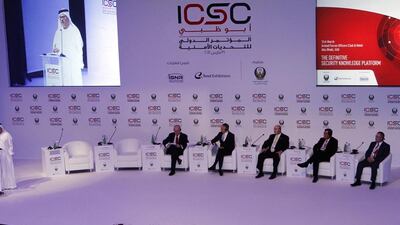ABU DHABI // Regional balance and non-interference in the internal affairs of neighbouring states were yesterday placed firmly at the heart of the UAE’s security policy.
They were two of six key pillars identified by Dr Anwar Gargash, the Minister of State for Foreign Affairs, as crucial in combating the scourges of extremism and fundamentalism.
The others are a moderate agenda, stable socio-economic conditions, international partnerships for energy security and a meaningful role for international organisations such as the GCC, the Arab League and the United Nations.
The principle of non-interference is essential, Dr Gargash told a security conference in the capital.
“Arab affairs should be settled within the framework of the Arab world because the Arab arena then becomes [accessible] to many regional players,” he said. “I think this is a risk that threatens all Arab countries.”
The issue is at the heart of a diplomatic rift between Qatar and other Arabian Gulf states. The UAE, Saudi Arabia and Bahrain accuse Doha of interference in their internal affairs with support for the Muslim Brotherhood, and have recalled their ambassadors.
“There is a very rapidly changing status quo in the region characterised by political instability and violent extremism, and we have seen it since the Arab Spring started in 2011,” Dr Gargash said.
“This added more risks in an already risky environment.”
Many regional and international parties were seeking to exploit instability to realise their own strategic objectives, he said. "No doubt this poses a challenge for regional balance. Although we are far from issues such as Crimea, they cause anxiety in security."
He said one security pillar was stable national socio-economic conditions.
“There must be strong and effective police and military forces because not every threat faced by countries is international,” Dr Gargash said. “There are many regional challenges so we should have the potential to face these threats. As [much as] the UAE and other countries need regional allies, we have to start with our own self-power and potential.”
He said there should be a balance between the UAE’s interests and other countries’ foreign policy.
“There is a kind of organic correlation between our own potential and the extensions for policy. A moderate agenda is another pillar – the UAE has created a very tolerant internal environment that accepts all nationalities, religions, ethnic groups and backgrounds so a moderate attitude is an important element in our own perspective in dealing with security issues.”
Regional balance was also an issue, he said. “The UAE is important but not that big a country so part of our own thinking is that the domination or hegemony of one country over another is not in the interest of other countries.
“There must be balance so that not one country acts as an influential power, like a ‘mini superpower’, and imposes its own terms and conditions. This is a very important foundation.”
International and regional organisations, such as the GCC, the Arab League and the United Nations, also have a crucial role to play.
"Sometimes, we may lose hope in their effectiveness, such as in the Syrian crisis," Dr Gargash said. "But they play an important role as they have the ability to move at a diplomatic level so we find political support and capability of manoeuvring, although sometimes limited, to achieve regional security."
But he said extremism and fundamentalism remained one of the major challenges.
“We thought it had been eradicated in the past because of the rapid developments that took place in Afghanistan and Iraq,” Dr Gargash said. “But we see them clearly in Syria and Iraq and this undoubtedly threatens other regions. It is a problem that is worsening in light of the chaotic situation that prevails.”
He said police and defence bodies should cooperate to tackle the issue.
“We saw in the past decade that the main competition over the Arab region is in the hands of non-Arab parties and we think this isn’t at all in our interests.
“There is a weak response by the international community towards what is happening in Syria so unless we have a decisive solution, we will see an additional three or four years of the same madness happening there now.
"Partnerships should be built; regional security is a collective issue and we hope that the GCC will overcome this crisis. We have to work together, we will grow together and prosper together in the face of dangers."
cmalek@thenational.ae

